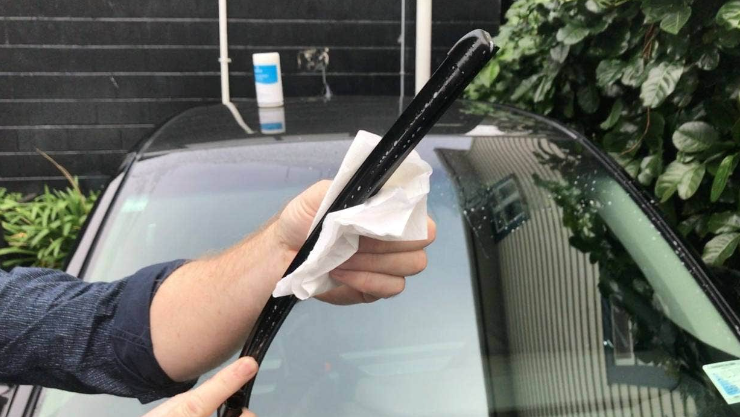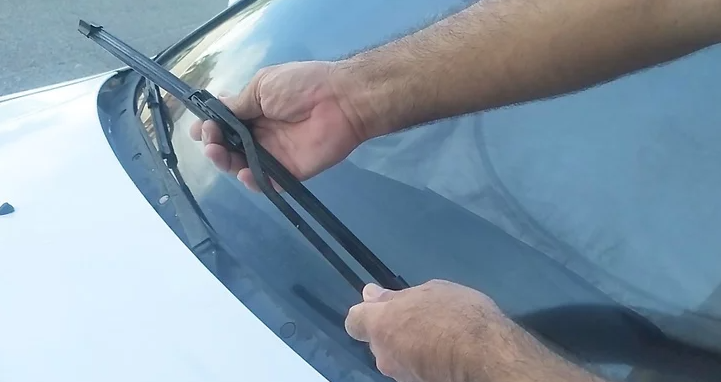Why Are My Windshield Wipers Squeaking?
Photo by Sergey Isaev
Whether you’re an automobile college student or the average road user, you know that keeping your eyes on the road is the most important thing for driving safely. Windshield wipers are crucial to help you do that, but why do they sometimes squeak when using them?
Windshield wipers normally glide smoothly over your windscreen quietly. Any squeaking noises you hear typically happen because something is causing excess friction on the glass as the wipers move. That could be due to a dirty windshield or a dirty wiper. A dry windscreen can also cause the same problem, as will worn-out wipers or those you install incorrectly.
This article will walk you through the reasons your windshield wipers are squeaking. Simultaneously, you’ll learn what you can do to solve the problem and get rid of the noise.
Let’s get started.
Photo by glass.com
1. Dirty Wiper Blades
The first and most common reason you have squeaky windshield wipers is that the blades are dirty. Specifically, the blades have collected a buildup of rough materials like sand and other tiny debris between the blade and the windscreen surface.
So when you turn the wipers on, they’ll scrape that trapped debris against the glass as they move. The friction generated by that process causes the squeaking noises you hear.
As you can imagine, this problem causes small amounts of damage to your windscreen. In fact, the damage will likely be barely noticeable to the naked eye, even if you’re sitting inside your vehicle.
Still, even a minor scratch on your car’s windscreen is terrible news, which is why you’ll want to troubleshoot the issue and fix it as soon as possible. Until you do that, it’s best not to use the wipers at all.
How to solve this problem: This problem is straightforward to resolve. Firstly, you must raise your wipers and separate them from the windscreen. Then, you can proceed to clean them thoroughly.
Your goal here is to remove all debris trapped at the wiper blade. So, start by washing the blades with a hose and then wipe them down individually.
Use a microfiber cloth that doesn’t leave any threads behind for the best results.
2. Dirty Windscreen
Aside from dirty wiper blades, the windshield itself could be to blame, especially if it’s excessively dusty and dirty.
Remember: wiper blades work by gliding over the windshield and pushing water aside. That’s not going to be easy to do if a lot of dirt is stuck to the glass.
Under normal conditions, the wiper blades will move back and forth on the windscreen without a problem. However, excess dirt will produce friction which then leads to noise.
The dirt and friction might not be as damaging to the windshield itself. Still, it will undoubtedly wear out your wipers prematurely.
How to solve this problem: You can solve this problem using the same solution used in the previous section: thorough cleaning. But after you raise the wiper blades, your focus will be on cleaning the windscreen and making it spotless.
Simultaneously, you should also give the wiper blades a thorough wipe-down, as there will likely be dirt on them.
3. Not Enough Moisture
One thing drivers sometimes forget is wiper blades only move smoothly when there’s enough moisture on the windscreen.
That’s right! They’re not designed to function correctly when the windshield is dry, and even less so when it’s dusty.
After all, the primary purpose of a wiper blade is to help you maintain visibility of the road in front of you while driving in wet, rainy, and low-visibility weather conditions.
So, if you find your wipers squeaking, ask yourself if you’re using them correctly. You might have a habit of using them without any water present.
How to solve this problem: Assuming your wiper is in excellent condition, there’s nothing else for you to do but change your habits when using the wiper. Firstly, you should only turn them on when it’s raining, even if only slightly.
But if you must clear something from your windshield when there’s no moisture, toggle the controls to spray wiper fluid first.
You’ll find that your wipers will squeak less and less the more you wet your windshield first.
Photo by Hella
4. Worn-Out Wipers
A set of wiper blades will typically last for 6-12 months before wearing out. So, if you haven’t changed your wipers within that timeframe, that’s likely the reason you’re experiencing squeaking noises.
Remember: the part of the wiper that rubs against your windshield is made of rubber. While still new, the rubber is somewhat soft and can glide over the surface of the windscreen without a problem.
But thanks to natural wear and direct exposure to sunlight, that rubber gradually hardens after several months of use. That causes excess friction as you use the wiper, producing the squeaking noises you hear.
How to solve this problem: The only solution to this problem is to replace your wipers with brand-new ones. That will eliminate the noise instantly and protect your windscreen from damage.
You can also prevent this problem by being mindful of when you should replace those wipers next. Then, you can preemptively buy new ones and switch them out before the squeaking noises happen again.
Photo by wikiHow
5. Wrongful Installation
Lastly, if your wipers are still squeaking despite being new and clean, you must consider that you’re not using them correctly.
Firstly, you may have installed the wrong wiper blades on your car. Wipers aren’t all made the same, so you must only use the ones designed specifically for your car brand and model.
Besides that, you might have also installed the wipers wrongly. As a result, they apply too much pressure to your windscreen, causing the squeaking you hear.
How to solve this problem: Firstly, always ensure you’re buying wiper blades designed specifically for your car model. Then, follow the instructions on the packaging to ensure you’re installing them correctly.
Final Thoughts
Wiper blades might seem like they’re less important than other car parts. But the truth is they play the critical role of keeping your windshield clear. That way, you can drive safely because you can see any road dangers ahead.
Automobiles these days rely on plenty more parts, each playing crucial roles in your car’s safety and efficiency. If you are passionate about these and other automotive concepts, check out one of the many leading courses at TOC Automotive College, Malaysia’s Award Winning Automotive College.






